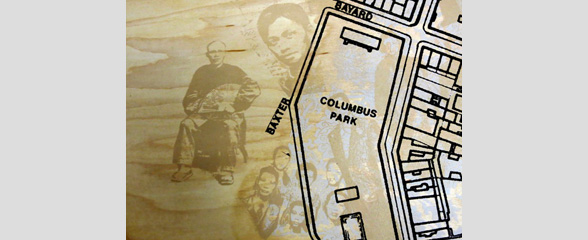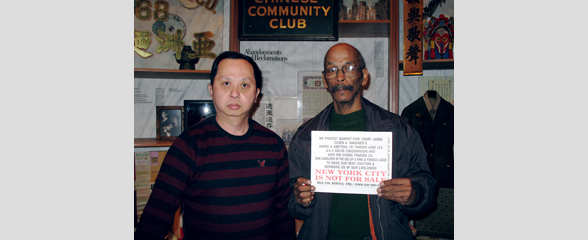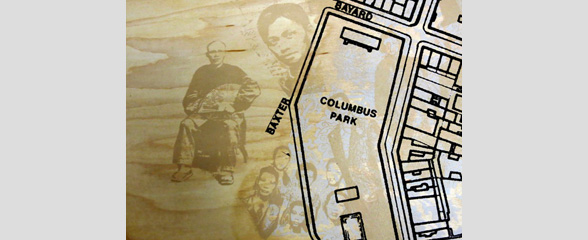Immigrant business enterprises

2008.040.003 Oral History Interview with Ching Yeh Chen February 6, 2008
Born in Chongqing, China and raised in Taiwan, Ching Yeh Chen came to the United States in 1971 to pursue a graduate and masters degree. Chen finally settled in New York and joined her husband operating a retail corporation, Pearl River Market, which was officially founded in 1980. Discussing the history of Pearl River, Chen explains that the corporation had been created to introduce the “real China†to the American society, since as Chen argues there was no significant relationship between the two countries at that time. Some of the challenges the company confronted included government suspicions, increasing rent prices, and an ever-changing customer base. Chen describes Chinatown as being a relatively unsafe environment during the seventies and eighties, which she believes began to change in 1990. She also describes both the rise of the American tourist clientele during the 1990s and the shrinking Chinese garment factory customer base. Finally, she predicts that after a decade, when their lease expires, Pearl River may fade away, as she and her husband will be reaching retirement age and the business will not be handed down to their children. Nonetheless, from her perspective, change is invaluable and Chinatown businesses and residents must be open to the neighborhood evolving – “that’s the challenge, that’s the pressure, that’s the fun.â€

2008.040.010 Oral History Interview with Han Ho Tran March 13, 2008
Mr. Tran emigrated from Vietnam and settled in Brooklyn, New York in 1990, three years after which he opened a family grocery business. Even though he had contracted a five-year lease that was projected to last until 2003, a new landlord took over the building in 1999 at which time Tran received an eviction notice. Ultimately, after seven years of successfully running his grocery business, Tran lost his grocery store—and with it his source of income—over a rent dispute. According to Tran and his attorney, he presented all necessary documentation in court to prove that he was leasing only one property space and had paid his monthly rent in a timely fashion. Unfortunately, Trans initial trial attorney specialized in criminal law not tenant and landlord disputes, and Tran was overruled after his new landlord produced two fraudulent documents which claimed that Tran had agreed to lease two property spaces and was thus deficient in one of the rent payments.
Tran was evicted and lost all of his business property and assets, which were confiscated by the new landlord. He has spent the last seven years fighting the case with little success. During his interview, Tran vocalizes his concerns regarding business closures, informing residents about their rights, and achieving a fair justice system. Tran believes this is a common situation in Chinatown today but that few are willing to fight as he has done.

2008.040.013 Oral History Interview with Larry Goodman December 16, 2007
Larry Goodman, todays owner of his familys corporation Grand Machinery Exchange, Inc., recounts how his first generation Polish grandfather founded the company in 1927. Goodmans father Jerry and uncle Isidore took control of the business in 1947, and Larry Goodman later succeeded his father in 1983. According to Goodman, Centre Street machinery dealers were predominantly Jewish and were often afraid of non-Jewish “outsiders.†These business men were concerned with gaining respect and carried physical and psychological hardships because of this work ethic. Goodman also recalls the mixture of unity and intense competition between Jewish and Italian machinery dealers, the whole of which was referred to as the “forty thieves,†since most of the dealers were considered unrefined and were occasionally accused of having questionable business ethics.
Goodman reminisces about Chinatown as the industrial center of Manhattan, where he saw gradual sociological changes between the 1950s and 2000, including industry, hardware, and supporting retail spaces systematically leaving the area. Goodman sold the Grand Machinery Exchange shop building in 2005, explaining that business was no longer viable on Centre Street. He also notes the growing presence of Chinese-owned businesses on Centre Street, incorporating the neighborhood as a part of Chinatown rather than SoHo. Goodman reflects on how Centre Street has cycled through machinery and manufacturing, the garment industry, living-working spaces for creatives, and now finally to expensive developments. Furthermore, when asked to imagine the future of Chinatown, Goodman argues that money will dictate the outcome as part of a natural economic cycle. In his eyes, wealthy populations will move into the area, demand more luxury services and support and retail to accommodate their lifestyle and living spaces, and replace “mom and pop†establishments that can no longer afford to remain there.

2008.040.022 Oral History Interview with Spring Wang September 8, 2008
Spring Wang is an independent developer who was born in China and raised in Taiwan. In this oral history, she discusses her experience of moving to the United States in 1968, where she attended college and became a Marxist heavily involved in political and social movements. One organization with which she associates herself is Asian Americans for Equality (AAFE), a group devoted to talking about social services, equal employment opportunities, and housing development. She reflects on her experience in New York’s Chinatown, paying particular attention to the infrastructure and ongoing development that trickles into Soho, the Lower East Side, and Tribeca.
Events like September 11th and the global economic crisis come into play when Wang analyzes the demographic shifts in the community. According to Wang, new Chinese immigrants are more self-confident and forward-looking in contrast to earlier immigrants. She believes that because Chinatown is a small area, the institutions or physical aspect of the neighborhood is more essential than the residential population to the survival of Chinatown. She proposes that Chinatown builds larger institutions, advocating for the creation of places with more cultural spirit and symbolic significance to act as a “magnet†for the people.